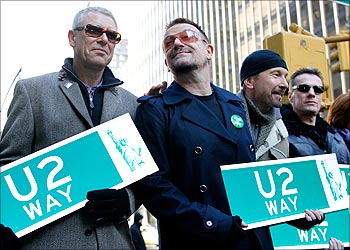
According to a recent Guardian profile of the band, as part of their ongoing 360 tour, when U2 strikes up the chords to Sunday Bloody Sunday, overhead video screens flash images of protesters on the streets of Tehran, alongside Rumi's Farsi poetry.
Since the 1980s, ever since penning Sunday Bloody Sunday, a heart-breaking look at violence in Northern Ireland, U2 has never withheld its strong political opinions.
Theirs is a brand of advocacy that has many supporters and many detractors. Some appreciate the band's efforts to bring the world's most horrific stories to a mainstream audience: HIV/Aids in Africa, the incarceration of Burmese opposition leader Aung San Suu Kyi and so on.
But there are critics too, who can be quite vociferous.
They say that flashes images of centuries old poetry alongside a one-minute montage of violence in Tehran is horribly reductive in attempting to address a complex situation.
Travel writer Paul Theroux famously castigated Bono as part of a group of 'mythomaniacs -- people who wish to convince the world of their worth'.
So is Bono a transformative figure, able to turn art into real, tangible change? Or is he a self-satisfied Messianic blowhard interested in puffing up his own ego?
Whether you fall into one camp or the other, or perhaps even somewhere in between, it's difficult to think of a more socially conscious and politically active band.
Above all else, it's made lead singer Bono one of the most polarising figures in music today. People either love him or hate him. And much of that emotion is based on his politics.
That, apparently, suits Bono just fine.
'I can be annoying,' he told the Guardian. 'I have a kind of annoying gene.'
Image: Adam Clayton, Bono, The Edge and Larry Mullen hold street signs after a portion of West 53rd Street was renamed U2 Way in New York earlier this year. (Photograph: Gary Hershorn/Reuters)